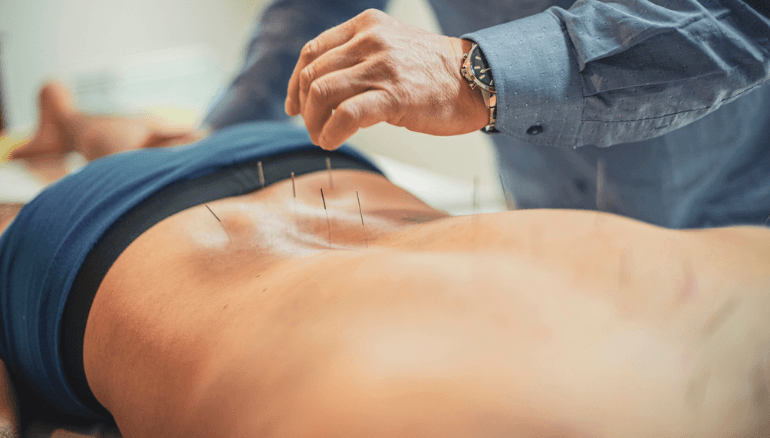Question
Does acupuncture help with male infertility?
Answer
Acupuncture is a form of traditional Chinese medicine that’s based on the theory that health problems stem from an interruption of the body’s natural flow of energy (called chi). The practice involves inserting small needles into different areas of the body to stimulate the body’s chi.
For an ‘alternative therapy’, there’s actually quite a bit of conventional scientific evidence to support the use of acupuncture for the treatment of many health conditions[1]. Unfortunately, acupuncture does not help with male infertility.
Firstly, we need to understand evidence quality
The highest quality scientific evidence for medical treatments comes from randomised controlled trials (RCTs). In these studies, patients get allocated at random to receive either the treatment being investigated or a placebo. The treatment might be a pill containing a new drug, so the placebo would be a pill that looks, tastes and smells the same but without the drug. At the end of the study, outcomes are compared between the two groups.
Random allocation of participants in RCTs ensures there’s no bias as to who is in which group. Using a placebo that seems identical to the treatment is important so participants don’t know what group they are in, because they might behave differently if they knew. The best quality evidence comes from RCTs where the participants, the people caring for them, the people running the trial, and the people analysing the data, are all ‘blinded’ to treatment (i.e. they don’t know who got what). This is the best way to be confident that, if there’s a difference between groups in the RCT, the effect is due to treatment and not anything else.
It’s hard to do a blinded trial of acupuncture because it’s difficult to have a perfect placebo (you’d notice if a needle was inserted or not). Even when acupuncture is compared to sham acupuncture (putting the needles in places that should have no effect), the acupuncturist isn’t blinded.
It’s also difficult to do RCTs of treatments for infertility. Ideally, you’d get a bunch of infertile males and randomise them to treatment or placebo, and see whose partners get pregnant. The trouble is, you can’t control for the fertility of their partners, and you’d have to try to standardise things like how often they had intercourse. That’s why, for studies of infertility, the outcome that’s measured usually isn’t whether a partner gets pregnant; it’s something like sperm count or movement (motility).
The evidence about acupuncture and male infertility
When there’s not a lot of data about a treatment (because there are only a few studies, or they don’t have many participants) there’s a way of combining the findings of different studies in a meta-analysis. Another way of looking at all the evidence is to systematically search and examine all the scientific literature on a topic.
There are a few meta-analyses and systematic reviews about acupuncture and different aspects of male infertility that have been published in the last few years, which agree that there’s not enough evidence to support the use of acupuncture for treating male infertility[2],[3],[4],[5],[6].
Cochrane Reviews are the holy grail of evidence-based medicine, and there’s one from 2013 about acupuncture and outcomes of IVF for infertile couples. There was “no evidence of overall benefit of acupuncture for improving live birth rate”2.
A 2014 systematic review and meta-analysis found overall increases in sperm motility and sperm concentration but “evidence showing that acupuncture might improve poor semen quality is insufficient because of the small number of studies, inadequacy of procedures and/or insufficient information for semen analysis, high levels of heterogeneity, high risk of bias, and poor quality of reporting”3.
The most recent systematic review and meta-analysis concluded that “the current evidence does not support acupuncture as an effective treatment for [low sperm count or low sperm motility]; therefore, acupuncture is not currently recommended as a treatment for these conditions”6.
A reassuring finding from these studies is that there were no bad effects of acupuncture on male fertility. “However, owing to the high risk of bias among the included studies, the evidence is limited and more large-scale, high-quality clinical trials are needed in the future”6.
If you’ve got concerns about your fertility and you’re looking to improve your preconception health, you can find more information here.











